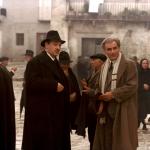‘Christ Stopped at Eboli’: An Italian Saga Returns to the Screen in Full

Carlo Levi’s memoir, “Christ Stopped at Eboli,” was a literary sensation in post-Fascist Italy. First published in 1945, the book is Levi’s memorable account of life among impoverished Italian villagers in the 1930s. Three decades later, an immersive and engaging film adaptation directed by Francesco Rosi enshrined the book’s underlying neorealist credo — giving voice to the voiceless.
Originally made for Italian television as a 220-minute mini-series, Rosi’s “Christ Stopped at Eboli” was shown in the United States in 1980 at approximately half its length and under the title “Eboli.” Considering the significance of the book and the stature of the director, the American theatrical premiere of the full version, now at Film Forum, is an event.
Levi, a painter, doctor and man of letters in his native Turin, was forced into exile in the southern hinterlands as a punishment for his anti-Fascist activities. In the mid-1930s, as Italy prepared to invade Ethiopia, he was sent to a small town he calls Gagliano; his account of his yearlong stay there was written years later, in Florence, while he was hiding from the Gestapo. The book’s title comes from a local saying about Gagliano’s isolation: Eboli is the last station on the train from the north; not even Christ cared to venture this far south.
“Christ Stopped at Eboli” was published the year World War II ended. At the same time, Roberto Rossellini’s “Rome, Open City” heralded a new naturalistic Italian cinema, and like that movie, Levi’s memoir was an international success. A front-page essay in The New York Times Book Review described it as sui generis, by turns “a diary, an album of sketches, a novelette, a sociological study and a political essay.” Rosi gives “Eboli” a more straightforward narrative, juxtaposing everyday fascism with Gagliano’s archaic ways, a populist historical pageant where modernity meets the medieval ages.
The movie was shot on location in the region where the book is set. Levi (Gian Maria Volontè) finds himself in a starkly beautiful and backward place, a crumbling town of cavelike quarters. The superstitious peasants, largely played by local people, live with their animals and a host of unseen presences — skittish angels, the mischievous spirits of unbaptized infants and Mussolini, the godlike figure who addresses them on the radio.
Soon after Levi’s sister (Lea Massari) comes from Turin to visit, encouraging him to be engaged with his new neighbors, the movie erupts with ideas. If the first half suggests the neorealist Rossellini of “Paisan” in showing the condition of life in Gagliano, the second half is closer in spirit to his TV biopics, like “Socrates,” in allowing the people to hold forth on their various philosophies. As Levi comes to understand the peasants’ way of thinking, the movie becomes a series of disquisitions — including a drunken priest’s Christmas Eve sermon opposing the Ethiopian war. Ironically, it’s this victory in Africa that frees Levi to return home under a general amnesty. A brief coda shows him back in Turin, pondering his experience.
“This is a movie that repeatedly sends its audience back to the book on which it is modeled,” Janet Maslin wrote in her Times review of “Eboli.” That’s not necessarily bad, particularly if the book is as rich as Levi’s. But midway through, Rosi’s movie is fully its own thing — a 20th-century saga played out in a remote backwater and compressed into a single year.
'Christ Stopped at Eboli' - is playing through April 18 at Film Forum, Manhattan; 212-727-8110, filmforum.org.
James Lewis Hoberman, known as J. Hoberman, is an American film critic, journalist, author and academic. He began working at The Village Voice in the 1970s and now writes for the New York Times and New York Review of Books and other publications.
